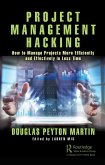Managing Business Projects: The Essentials differs from many other project management textbooks. Foremost, it is about business projects as opposed to construction or engineering projects. Although many techniques, like schedule management, apply to both, they are usually applied differently. As its title conveys, the book explains the essential techniques and perspectives needed for business projects to be successful. The focus is on small- and medium-sized projects, up to $20 million, but often below $1 million. Some literature favors large and mega-projects, but for every mega-project, there are many thousands of smaller projects that are vital to the organization and could involve considerable complexity and risk. Nevertheless, the techniques outlined here also apply to mega-projects and their many subprojects; they even apply to some aspects of construction or engineering projects.
This book does not aim to cover all project management techniques. In real life there is simply no time for sophisticated 'should-dos.' Rather, it covers the essentials that apply to almost all business projects; these are unlikely to change in the future even as technology and methodologies advance. The driving idea, which is stated repeatedly, is to do the essentials and to do them consistently and well.
Strong emphasis is placed on things that happen before, around, and after the project itself. So, while the basic disciplines like engaging with stakeholders, managing scope, schedules, costs, risks, issues, changes, and communication, are thoroughly explained, other important aspects are covered. These include: governance of a project and of a portfolio of projects, project selection with its financial and non-financial aspects, effective use of the business case through to benefits realization, procurement, outsourcing and partnership, and also the agile mindset that is valuable beyond Agile projects.
Besides project managers and sponsors, this book is intended for people who are working in business or government, at any level, or for MBA students. It offers perspectives that enable them to learn more from their everyday experience. It is not aimed at undergraduate students, although many would benefit from the contents.
This book does not aim to cover all project management techniques. In real life there is simply no time for sophisticated 'should-dos.' Rather, it covers the essentials that apply to almost all business projects; these are unlikely to change in the future even as technology and methodologies advance. The driving idea, which is stated repeatedly, is to do the essentials and to do them consistently and well.
Strong emphasis is placed on things that happen before, around, and after the project itself. So, while the basic disciplines like engaging with stakeholders, managing scope, schedules, costs, risks, issues, changes, and communication, are thoroughly explained, other important aspects are covered. These include: governance of a project and of a portfolio of projects, project selection with its financial and non-financial aspects, effective use of the business case through to benefits realization, procurement, outsourcing and partnership, and also the agile mindset that is valuable beyond Agile projects.
Besides project managers and sponsors, this book is intended for people who are working in business or government, at any level, or for MBA students. It offers perspectives that enable them to learn more from their everyday experience. It is not aimed at undergraduate students, although many would benefit from the contents.








